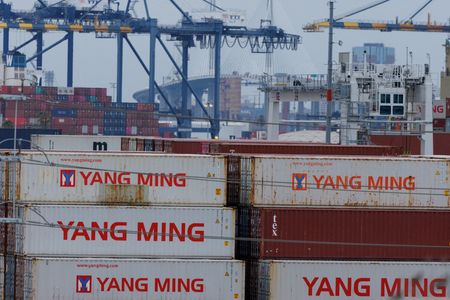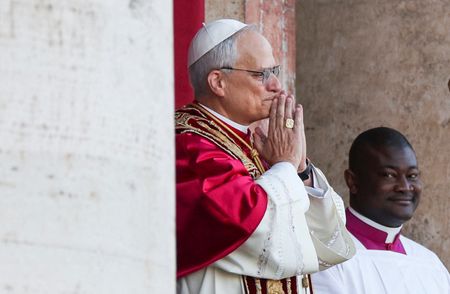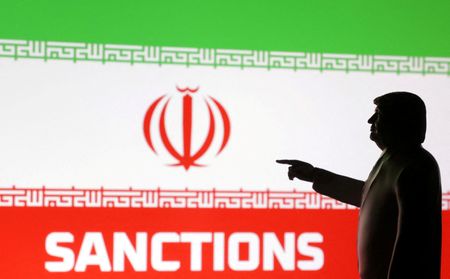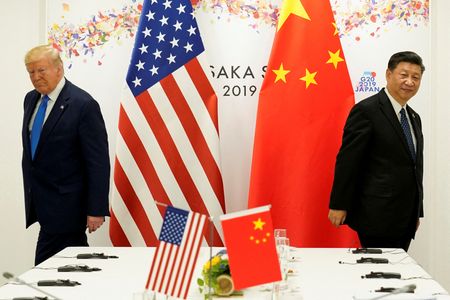By Michael Martina, Jeff Mason
WASHINGTON (Reuters) -U.S. President Donald Trump on Wednesday suggested China initiated upcoming senior-level trade talks between the two countries and said he was not willing to cut U.S. tariffs on Chinese goods to get Beijing to the negotiating table.
The U.S. announced on Tuesday that Treasury Secretary Scott Bessent and U.S. Trade Representative Jamieson Greer will meet with China’s top economic official on Saturday in Switzerland, marking an initial step in potential negotiations over a blistering trade war that is disrupting the global economy.
The development was welcomed in financial markets that have been battered by Trump’s often-chaotic rollout of his tariff policies, with Wall Street snapping a two-day losing streak.
Prior to Tuesday’s announcement, it was far from clear when – or even if – the world’s No. 1 and No. 2 economies would engage to defuse the standoff.
Beijing had adopted fiery rhetoric as tensions with Washington ratcheted up, repeatedly saying it would not engage in negotiations unless the U.S. withdrew its tariffs. Its Commerce Ministry had suggested it was the U.S. side that had signaled a desire to hold talks.
“They said we initiated? Well, I think they ought to go back and study their files,” Trump said in response to a reporter’s question at a White House event where his ambassador to China, David Perdue, was sworn into office.
Asked if he was willing to reduce tariffs to get China to negotiate, Trump said: “No.”
“We were losing with China, on trade, a trillion dollars a year – more, actually,” Trump said. “You know what we’re losing now? Nothing. That’s not bad.”
The planned talks come after weeks of escalating tensions that have seen duties on goods imports between the world’s two largest economies soar well beyond 100%, amounting to what Bessent on Tuesday called the equivalent of a trade embargo.
The impasse, compounded by Trump’s decision last month to slap sweeping duties on dozens of other countries, has upended supply chains, roiled financial markets and stoked fears of a sharp downturn in global growth.
Bessent said after the meeting announcement that the talks were about “de-escalation.”
Jake Colvin, head of the National Foreign Trade Council, said the current tariffs were untenable and could cause huge damage to both economies if they persisted for months or years.
“I would take it as a positive sign that they’re talking, which appears to be the latest step in a series of de-escalatory moves,” he said.
Craig Singleton at the Foundation for the Defense of Democracies said it was notable that China agreed to talks without any U.S. concessions.
“The Trump administration did not lift tariffs, pause enforcement actions, or even promise a negotiating roadmap — and yet China agreed to send Xi’s top economic czar, Vice Premier He Lifeng,” he said. “It’s acknowledgment that the tariffs are having their intended effect.”
EXEMPTIONS AND RETALIATION
But U.S. officials were also feeling the pressure, including growing public concerns about shortages and rising prices.
Testifying before the House Financial Services Committee, Bessent said the Trump administration is considering exempting car seats, baby strollers, cribs other essential items for transporting children from the 145% tariffs in place on China.
China has also approved some exemptions from its 125% tariffs on U.S. goods.
However, Trump sent mixed signals later, telling reporters he would look at specific industry requests for exemptions, but preferred to keep the duties broader and less complicated.
In 2018, the Trump administration exempted some products produced in China from 25% tariffs, including bicycle helmets and child-safety furniture such as car seats and playpens. However, car seat component parts, cribs, bassinets, diaper bags and wooden safety gates were not exempted.
In Singapore, the European Commission’s trade commissioner, Maros Sefcovic, said the bloc would announce on Thursday details of its next countermeasures against U.S. tariffs, if negotiations – not yet begun – ultimately failed.
NEW ENVOY
At the White House event, Trump said he and Perdue, a former Republican U.S. senator from Georgia, would “work together very closely” on U.S. relations with China.
Perdue touted his personal relationship with Trump, something that could raise his stock in Beijing if Chinese officials assess he has a direct channel to the president.
“I want the world to know that I know this man personally. He loves this country, and I am glad to be your man in China,” Perdue said.
In nominating Perdue, Trump had said he would be instrumental in implementing a “productive working relationship with China’s leaders.” During his confirmation hearing in early April, Perdue said the U.S. approach to China must be “nuanced, nonpartisan, and strategic.”
Last year, however, Perdue condemned Chinese President Xi Jinping as a “modern-day emperor,” writing in an essay that Beijing wanted to “destroy capitalism and democracy” and the U.S.-led world order.
(Reporting by Michael Martina, Jeff Mason and Jarrett Renshaw in Washington; additional reporting by Andrea Shalal and David Shepardson; Editing by Colleen Jenkins, Andrea Ricci and Sonali Paul)











